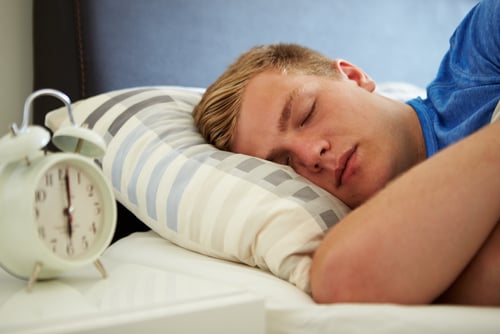Your Teen Isn't Lazy, He's Biologically Exhausted

Parents are as disgruntled and aware as teens are of how early in the morning school starts. While teens are hitting the snooze button over and over or sleeping straight through the alarm, parents are cursing the fact that they have to wake up extra early for work in order to get their kid to school. The teenage burden of waking up early for school is shared by the parent yelling across the house, texting, calling, pounding on the door, pulling off the sheets, bribing a favorite breakfast stop- just to name a few get-out-of-bed-tactics. Often, teenagers are branded with adjectives like ‘lazy', ‘disrespectful', and ‘unwilling'. A teenager's unwillingness to wake up extra early in the morning, sometimes to go to school in the dark, is less about laziness as it is about biology. Wendy Troxel made this argument in her TED Talk Why school should start later for teens, one that was likely celebrated by teenagers all over the country. Though it seems like a cultural characterization, teenagers sleeping in later is essentially a delay in the normal functioning of their biological clock.
People experience shifts in their biological clock every year as daylight savings and a shift into winter changes the amount of sunlight each person is generally exposed to. Seasonal Affective Disorder, for example, is partly due to a malfunctioning biological clock, which is caused by an imbalance in the production of melatonin. Melatonin is a naturally occurring hormone that tells the brain when it is time to go to sleep. Around the time the sun starts to set, the brain starts to slow down. According to Troxel's research, most adults experience a release of melatonin at about 9:00 p.m., which is why many teenagers lament about their parents being boring and going to sleep
too early
. Teenagers do not have a release of melatonin until 11:00pm- those wild kids staying up late. If a teenager is in bed on time they are likely tossing and turning attempting to fall asleep until they're finally tired. Waking up at the early morning hours for school is not the same as an adult waking up because there hasn't been enough sleep. Additionally, there hasn't been enough time for the biological sleep cycle to fully function. As a result, teenagers feel groggy and exhausted, lethargic and even a bit lazy.
Stonewater Adolescent Recovery offers a life-cleansing, foundation-building program to adolescent and teenage boys needing clinical care for addiction and/or alcoholism. Located in the remote Mississippi countryside, our beautiful home offers the perfect environment and privacy for total transformation in mind, body, and spirit.
Contact us today for information on our programs for treatment and academic support: 662-598-4214

.jpg)

